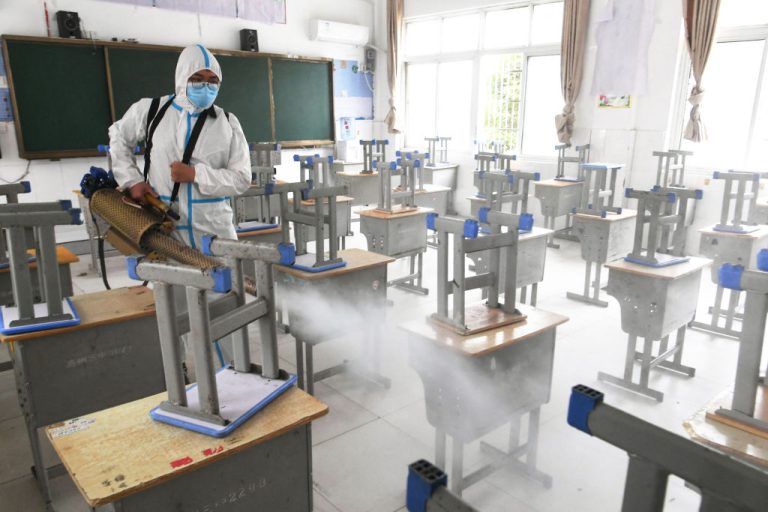Chinese regime authorities have poisoned at least 13 Uyghur Muslims in the Xinjiang Autonomous Region after spraying massive amounts of disinfectants from both the ground and air in its ruinous “zero-COVID” campaign as the regime fights an uphill battle against Wuhan Pneumonia.
The story was reported on Sept. 30 by Radio Free Asia, who stated that although 13 Uyghurs have died from disinfectant poisoning, comments harvested from Chinese social media appear to indicate that thousands more have been sickened.
RFA elaborated, “Many videos shared online show authorities spraying inner walls, furniture, bedding as well as inside refrigerators in homes in the region.”
The outlet confirmed the figures with a “local official in charge of overseeing 10 households in a village in Guma county,” who specifically stated the fatalities occurred on Sept. 20.
READ RELATED ARTICLES
- Rockefeller Foundation Spends Millions on ‘Nudging’ Citizens to Accept COVID Vaccines
- Chinese Companies Lay Roots in Mexico to Evade US Tariffs
- Beverly Hills Boutique Bans Face Masks as Area Crime Soars
Based on the description, the official appears to be a participant in the CCP’s Grid Management System, where ordinary citizens are deputized by the Party to maintain surveillance on their direct neighbors.
Success
You are now signed up for our newsletter
Success
Check your email to complete sign up
Similar tactics were also seen in Western countries at the height of the COVID pandemic and heavy-handed efforts to push vaccination, such as when Austria sought to conscript citizens at a salary of $44,000 per year to track down their fellow nationals who refused the injections.
The official RFA interviewed declined to be named, but admitted to the outlet that one of their own relatives had died from the poisoning.
One resident in the area told RFA that his 24-year-old son was kidnapped by authorities after refusing to let the hazmat suit-wearing officials into their home to soak it with chemicals.
The man explained, “The government sprayed disinfectants on the roofs and in the yards of each house to disinfect, and as a result, all of the residents passed out, and there was no one from the government to take them to the hospital.”
He detailed the plight of the community as they live under draconian lockdown conditions, “This is what the community is going through…There is nothing to eat, and the whole community has been knocked out by [authorities’] spraying the so-called disinfectant. We all don’t know what will happen tomorrow when we wake up.”
Earlier in September, RFA reported that at least a dozen people in the Xinjiang had died of either starvation or failing to receive medical care resulting from the Party’s inhumane lockdown mandates.
Relying on information from a local official, the 12 all perished within the first 20 days of the campaign.
In the case of disinfectant poisoning, when RFA contacted a Communist Party “information service hotline” to confirm details of the story, the operator they spoke with “did not deny the deaths” and referred the outlet to a secondary Party “Epidemic Command Center.”
After the outlet contacted the Center, the woman they spoke with “confirmed that there had been incidents of Uyghurs sickened by disinfectant poisoning at a local hospital.”
As RFA pushed her to give details on the death toll, she became angry and told their reporter, “Don’t ask such questions.”
Additionally, multiple residents the outlet spoke with stated that the area had not only been bombarded by a ground campaign of spray can-wielding Party functionaries, but that the regime had been conducting aerial dusting over the area for at least nine days.
According to the World Health Organization website, “in outdoor spaces, large-scale spraying or fumigation in areas such as streets or open market places for the COVID-19 virus or other pathogens is not recommended.”
The WHO’s explanation that “streets and sidewalks are not considered as routes of infection for COVID-19” also happens to contradict the Party and other international locales’ insistence on deploying an outdoor mask mandate.
“Spraying disinfectants, even outdoors, can be noxious for people’s health and cause eye, respiratory or skin irritation or damage,” the Organization states.
“This practice will be ineffective since the presence of dirt or rubbish for example, inactivates the disinfectant, and manual cleaning to physically remove all matter is not feasible,” the article reads, noting that the method is “even less effective on porous surfaces such as sidewalks and unpaved walkways.”
“Even in the absence of dirt or rubbish, it is unlikely that chemical spraying would adequately cover surfaces allowing the required contact time to inactivate pathogens.”














